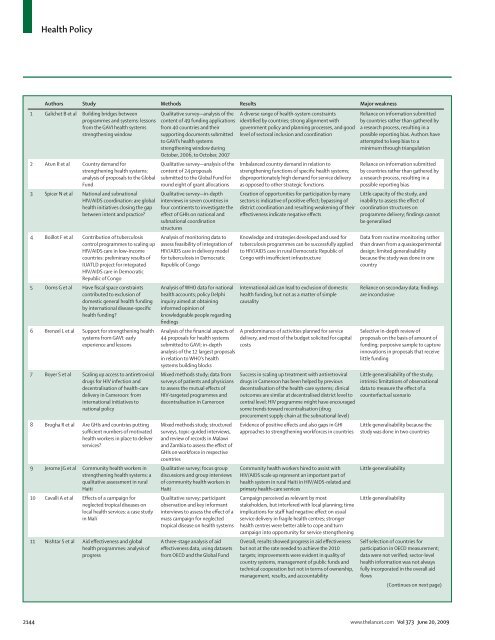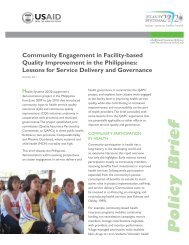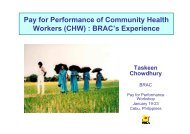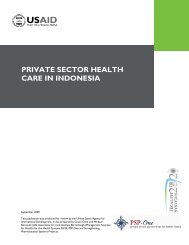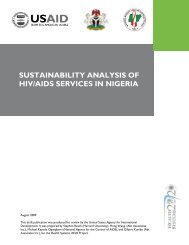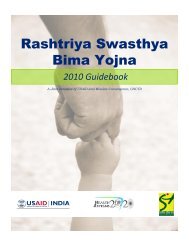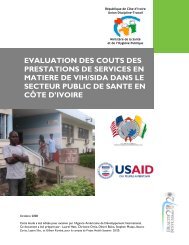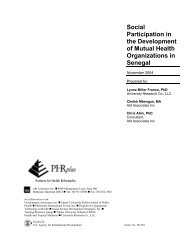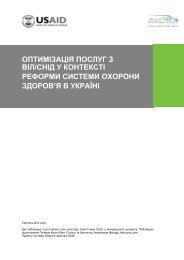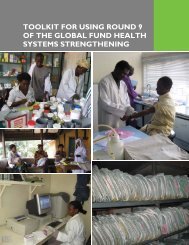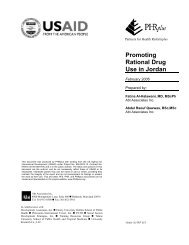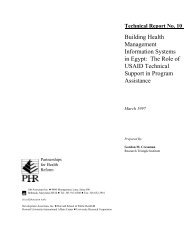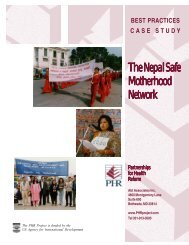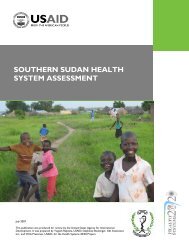An assessment of interactions between global ... - ResearchGate
An assessment of interactions between global ... - ResearchGate
An assessment of interactions between global ... - ResearchGate
You also want an ePaper? Increase the reach of your titles
YUMPU automatically turns print PDFs into web optimized ePapers that Google loves.
Health Policy<br />
Authors Study Methods Results Major weakness<br />
1 Galichet B et al Building bridges <strong>between</strong><br />
programmes and systems: lessons<br />
from the GAVI health systems<br />
strengthening window<br />
2 Atun R et al Country demand for<br />
strengthening health systems:<br />
analysis <strong>of</strong> proposals to the Global<br />
Fund<br />
3 Spicer N et al National and subnational<br />
HIV/AIDS coordination: are <strong>global</strong><br />
health initiatives closing the gap<br />
<strong>between</strong> intent and practice<br />
4 Boillot F et al Contribution <strong>of</strong> tuberculosis<br />
control programmes to scaling up<br />
HIV/AIDS care in low-income<br />
countries: preliminary results <strong>of</strong><br />
IUATLD project for integrated<br />
HIV/AIDS care in Democratic<br />
Republic <strong>of</strong> Congo<br />
5 Ooms G et al Have fiscal space constraints<br />
contributed to exclusion <strong>of</strong><br />
domestic general health funding<br />
by international disease-specific<br />
health funding<br />
6 Brenzel L et al Support for strengthening health<br />
systems from GAVI: early<br />
experience and lessons<br />
7 Boyer S et al Scaling up access to antiretroviral<br />
drugs for HIV infection and<br />
decentralisation <strong>of</strong> health-care<br />
delivery in Cameroon: from<br />
international initiatives to<br />
national policy<br />
8 Brugha R et al Are GHIs and countries putting<br />
sufficient numbers <strong>of</strong> motivated<br />
health workers in place to deliver<br />
services<br />
9 Jerome JG et al Community health workers in<br />
strengthening health systems: a<br />
qualitative <strong>assessment</strong> in rural<br />
Haiti<br />
10 Cavalli A et al Effects <strong>of</strong> a campaign for<br />
neglected tropical diseases on<br />
local health services: a case study<br />
in Mali<br />
11 Nishtar S et al Aid effectiveness and <strong>global</strong><br />
health programmes: analysis <strong>of</strong><br />
progress<br />
Qualitative survey—analysis <strong>of</strong> the<br />
content <strong>of</strong> 49 funding applications<br />
from 40 countries and their<br />
supporting documents submitted<br />
to GAVI’s health systems<br />
strengthening window during<br />
October, 2006, to October, 2007<br />
Qualitative survey—analysis <strong>of</strong> the<br />
content <strong>of</strong> 24 proposals<br />
submitted to the Global Fund for<br />
round eight <strong>of</strong> grant allocations<br />
Qualitative survey—in-depth<br />
interviews in seven countries in<br />
four continents to investigate the<br />
effect <strong>of</strong> GHIs on national and<br />
subnational coordination<br />
structures<br />
<strong>An</strong>alysis <strong>of</strong> monitoring data to<br />
assess feasibility <strong>of</strong> integration <strong>of</strong><br />
HIV/AIDS care in delivery model<br />
for tuberculosis in Democratic<br />
Republic <strong>of</strong> Congo<br />
<strong>An</strong>alysis <strong>of</strong> WHO data for national<br />
health accounts; policy Delphi<br />
inquiry aimed at obtaining<br />
informed opinion <strong>of</strong><br />
knowledgeable people regarding<br />
findings<br />
<strong>An</strong>alysis <strong>of</strong> the financial aspects <strong>of</strong><br />
44 proposals for health systems<br />
submitted to GAVI; in-depth<br />
analysis <strong>of</strong> the 12 largest proposals<br />
in relation to WHO’s health<br />
systems building blocks<br />
Mixed methods study; data from<br />
surveys <strong>of</strong> patients and physicians<br />
to assess the mutual effects <strong>of</strong><br />
HIV-targeted programmes and<br />
decentralisation in Cameroon<br />
Mixed methods study; structured<br />
surveys, topic-guided interviews,<br />
and review <strong>of</strong> records in Malawi<br />
and Zambia to assess the effect <strong>of</strong><br />
GHIs on workforce in respective<br />
countries<br />
Qualitative survey; focus group<br />
discussions and group interviews<br />
<strong>of</strong> community health workers in<br />
Haiti<br />
Qualitative survey; participant<br />
observation and key informant<br />
interviews to assess the effect <strong>of</strong> a<br />
mass campaign for neglected<br />
tropical disease on health systems<br />
A three-stage analysis <strong>of</strong> aid<br />
effectiveness data, using datasets<br />
from OECD and the Global Fund<br />
A diverse range <strong>of</strong> health-system constraints<br />
identified by countries; strong alignment with<br />
government policy and planning processes, and good<br />
level <strong>of</strong> sectoral inclusion and coordination<br />
Imbalanced country demand in relation to<br />
strengthening functions <strong>of</strong> specific health systems;<br />
disproportionately high demand for service delivery<br />
as opposed to other strategic functions<br />
Creation <strong>of</strong> opportunities for participation by many<br />
sectors is indicative <strong>of</strong> positive effect; bypassing <strong>of</strong><br />
district coordination and resulting weakening <strong>of</strong> their<br />
effectiveness indicate negative effects<br />
Knowledge and strategies developed and used for<br />
tuberculosis programmes can be successfully applied<br />
to HIV/AIDS care in rural Democratic Republic <strong>of</strong><br />
Congo with insufficient infrastructure<br />
International aid can lead to exclusion <strong>of</strong> domestic<br />
health funding, but not as a matter <strong>of</strong> simple<br />
causality<br />
A predominance <strong>of</strong> activities planned for service<br />
delivery, and most <strong>of</strong> the budget solicited for capital<br />
costs<br />
Success in scaling up treatment with antiretroviral<br />
drugs in Cameroon has been helped by previous<br />
decentralisation <strong>of</strong> the health-care systems; clinical<br />
outcomes are similar at decentralised district level to<br />
central level; HIV programme might have encouraged<br />
some trends toward recentralisation (drug<br />
procurement supply chain at the subnational level)<br />
Evidence <strong>of</strong> positive effects and also gaps in GHI<br />
approaches to strengthening workforces in countries<br />
Community health workers hired to assist with<br />
HIV/AIDS scale up represent an important part <strong>of</strong><br />
health system in rural Haiti in HIV/AIDS-related and<br />
primary health-care services<br />
Campaign perceived as relevant by most<br />
stakeholders, but interfered with local planning; time<br />
implications for staff had negative effect on usual<br />
service delivery in fragile health centres; stronger<br />
health centres were better able to cope and turn<br />
campaign into opportunity for service strengthening<br />
Overall, results showed progress in aid effectiveness<br />
but not at the rate needed to achieve the 2010<br />
targets; improvements were evident in quality <strong>of</strong><br />
country systems, management <strong>of</strong> public funds and<br />
technical cooperation but not in terms <strong>of</strong> ownership,<br />
management, results, and accountability<br />
Reliance on information submitted<br />
by countries rather than gathered by<br />
a research process, resulting in a<br />
possible reporting bias. Authors have<br />
attempted to keep bias to a<br />
minimum through triangulation<br />
Reliance on information submitted<br />
by countries rather than gathered by<br />
a research process, resulting in a<br />
possible reporting bias<br />
Little capacity <strong>of</strong> the study, and<br />
inability to assess the effect <strong>of</strong><br />
coordination structures on<br />
programme delivery; findings cannot<br />
be generalised<br />
Data from routine monitoring rather<br />
than drawn from a quasiexperimental<br />
design; limited generalisability<br />
because the study was done in one<br />
country<br />
Reliance on secondary data; findings<br />
are inconclusive<br />
Selective in-depth review <strong>of</strong><br />
proposals on the basis <strong>of</strong> amount <strong>of</strong><br />
funding; purposive sample to capture<br />
innovations in proposals that receive<br />
little funding<br />
Little generalisability <strong>of</strong> the study;<br />
intrinsic limitations <strong>of</strong> observational<br />
data to measure the effect <strong>of</strong> a<br />
counterfactual scenario<br />
Little generalisability because the<br />
study was done in two countries<br />
Little generalisability<br />
Little generalisability<br />
Self selection <strong>of</strong> countries for<br />
participation in OECD measurement;<br />
data were not verified; sector-level<br />
health information was not always<br />
fully incorporated in the overall aid<br />
flows<br />
(Continues on next page)<br />
2144 www.thelancet.com Vol 373 June 20, 2009


